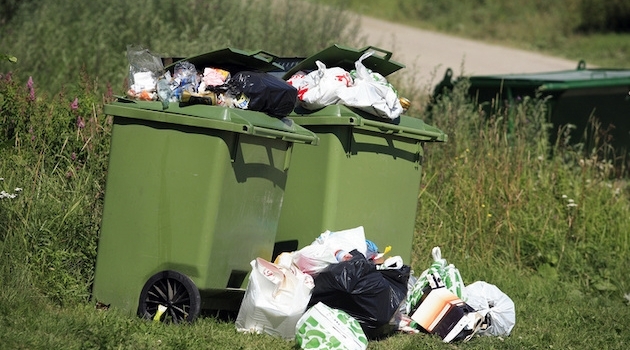Taking waste from problem to valuable biogas
Waste is not just a problem that needs dealing with and a symbol for unsustainable consumption. A market has grown around managing waste, which has resulted in a value for waste in today’s sustainable economy. An ongoing research project at Uppsala University is looking at biological waste from rubbish to biogas.
“Waste is paradoxical – on the one hand, we consume too much and see waste as a symbol for unsustainable consumption. At the same time a market for waste has developed. We have district heating plants that need feeding with waste while new professions are being created around waste, such as waste brokers,” says Tora Holmberg, a professor at the Department of Sociology.
Together with Claes-Fredrik Helgesson and Sebastian Abrahamsson, both at Uppsala University, and Malin Ideland, at the University of Malmö, Holmberg is running the project “Waste Work in the Sustainability Economy: Transforming Values of Biological Waste” which began in 2018 and will continue through 2020 with financing from the Swedish Research Council.
“We are examining how this worthless waste becomes something valuable and back again and we are following the path for how food waste becomes biogas. What happens along the way? There are many stakeholders and many transports. The waste economy is often shown as circular, but perhaps it is linear or a mix of the two.”
Residential area working with waste
An interesting example is the project “Nya Nordost” being run by Gästrike Återvinnare, a recycling company in Gävle. The residential area Nordost, a small, rundown neighbourhood, was in need of renovation. The municipality decided to also improve rubbish sorting for recycling in the area and install recycling for multiple types of products in the neighbourhood’s flats, hire waste managers, distribute information, put up signs and provide new rubbish bins.
How did this change what was put in the brown bags for food waste?
“We throw away about a third of what we bring home from the shop. From the brown bags, the waste is taken to pretreatment where it is pressed. Some of the waste is mixed into a slurry and sent to a biogas plant. The slurry is biodigested in large chambers where the biogas is formed,” explains Holmberg.
Biogas is a volatile resource and municipalities are constantly looking for new suppliers and customers. There needs to be bus companies and industries that can use the biogas, and what isn’t used is burnt.
“The biodigestion process produces mostly biofertilizer, but fertilizer isn’t something municipalities like to talk about on their websites when they want to motivate people to sort their rubbish for recycling. Biogas seems to have the right star appeal.”
Created a more pleasant community
So how did the “Nya Nordost” project go? We could see that the project created a more pleasant community and that residents socialised more with each other.
“There is an important social value in rubbish that you don’t usually think about,” says Holmberg.
One thing is for sure: rubbish will continue to be an important part of the new sustainability economy and the conditions that apply to rubbish are constantly changing. For example, what happens with biogas as a product if electric buses replace biogas buses?
“A lot is happening in the field, largely through fairly random events on the market at large, where politicians play an important role.”
Facts
The researchers are following household food waste and waste water and the processes, organisms and individuals associated with these forms of waste. They are looking at the entire chain of handling and organisation of waste: both municipal and private stakeholders and their roles in converting it into something with value.
Find out more
The project “Waste Work in the Sustainability Economy: Transforming Values of Biological Waste”
Annica Hulth

